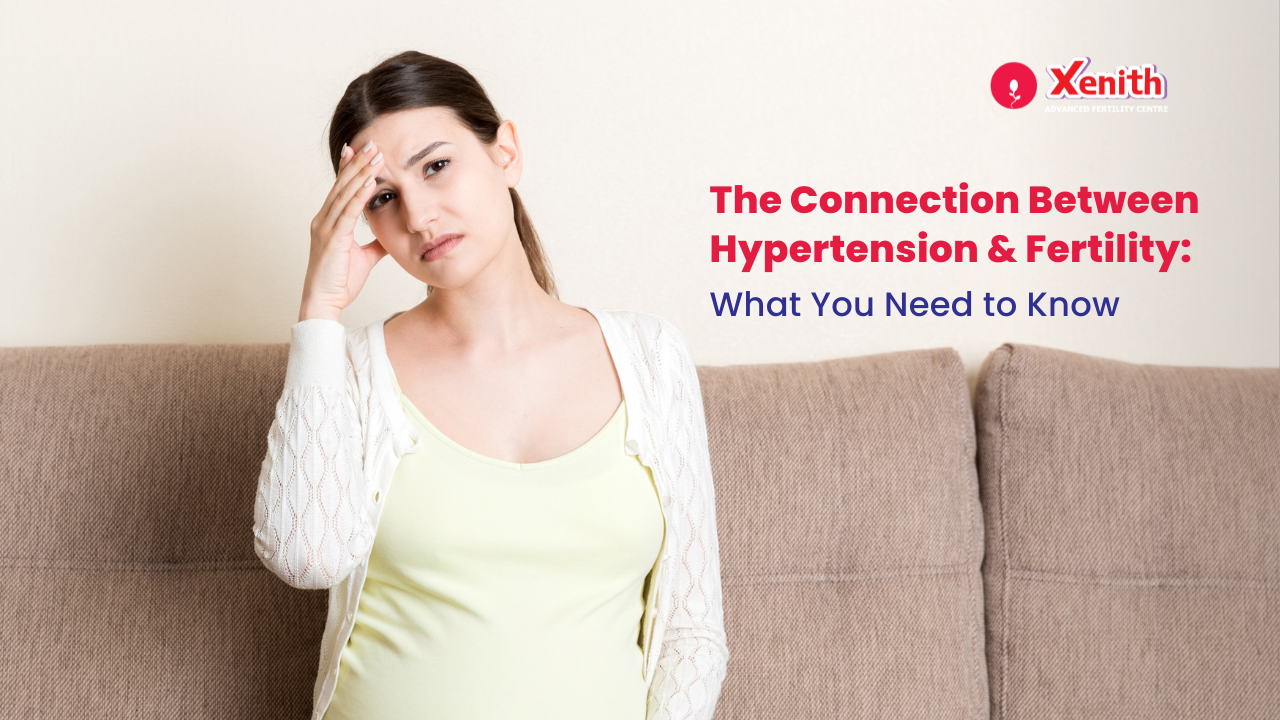Hypertension, or high blood pressure as it is called, is quite a common condition where the force of blood pushing against the artery is consistently too high and the heart has to work harder to pump the blood. Arteries carry blood from the heart to the various parts of the body at a higher pressure. The blood then returns back to the heart as the heart is resting and the pressure is lower. Blood pressure is thus measured using two numbers. The top number which is called systolic is the pressure when the heart contracts and bottom number is called diastolic when the heart rests. The blood pressure can vary throughout the day depending on what activity you are doing. Blood pressure is measured in millimetres of mercury (mmHg). Normal blood pressure is 120/80 mmHg or lower and blood pressure for hypertension is considered to be 140/90 mmHg or higher according to the WHO (1) . If it’s untreated, it could lead to heart attack, stroke or other health problems including issues with fertility and pregnancy. Having high blood pressure usually has no symptoms and so measuring your blood pressure would be a good way to check it. Some people need medicine to treat high blood pressure. Certain medications used to treat high blood pressure could affect your fertility.
Hypertension and fertility
Hypertension could affect fertility in various ways. It could lead to poor egg quality if it is associated with PCOS and metabolic syndrome due to excessive estrogen production in women. The embryo formed from a poor quality egg may not be able to implant successfully in the uterus lining and if it does implant, it may not develop properly leading to a miscarriage. (2) People with hypertension are often obese and this could also affect one’s fertility. Hypertension may also lead to poor blood supply to the endometrium which is the bed for the embryo to implant leading to poor placentation and implantation. Hypertension can be associated with other immunological issues which by themselves could be independent factors for infertility. All these together can influence fertility in women with hypertension.
Hypertensive males were found to have lower semen volume, decreased sperm motility or movement, and lower sperm count compared to people without this condition. Also, certain blood pressure medications could affect sperm quality and quantity and thus impact fertility. (3) Hypertension could also lead to erectile dysfunction and it could also be the result of the medication taken for treating hypertension. (4) Hypertensive men also have a higher risk of having lower testosterone levels. (5)
Hypertension and pregnancy
Hypertension could increase the risk of complications for pregnant women and their babies. Preeclampsia or hypertension during pregnancy sometimes newly develops after the 20th week of pregnancy. Hypertension could also be present prior to pregnancy. Either way, high blood pressure during pregnancy could be dangerous for both mother and baby. The placenta, which provides oxygen and nutrition for the baby, might not develop properly under high blood pressure and could cause issues like low birth weight, restrictions in fetal growth, premature labor, caesarean delivery, separation of the placenta from the uterus lining, which could have serious consequences, or other complications. It could also lead to stroke, seizures, kidney failure, liver problems etc.
Who is at risk?
Having certain chronic conditions like kidney disease, diabetes, sleep apnea, or being overweight could increase the risk of hypertension. Consuming too much alcohol, smoking, having too much salt in diet, not exercising regularly or dealing with high levels of stress could also predispose you to hypertension. There could also be a genetic link to hypertension. Other factors like being older than 40, having multiples like twins or triplets, having a previous history of hypertension or preeclampsia could also predispose them to hypertension.
Management of hypertension and preconception planning (6)
Women with hypertension who are planning to conceive should get some lab/blood tests done to see how their liver, kidney, and other organs are functioning. An ECG could be carried out to determine heart health. They should get their blood pressure checked regularly and should speak to their doctor about the medications they are on, since certain blood pressure medications could affect fertility and are not recommended during pregnancy because they could increase the risk of congenital abnormalities. Talk to your doctor about taking aspirin. The blood pressure should be strictly monitored and controlled within the normal limits. Once pregnant, there should be close monitoring for any development of preeclampsia and making sure there is proper fetal development and growth. Be aware of any symptoms of preeclampsia like headache, severe abdominal pain, changes in vision, shortness of breath, nausea/vomiting and sudden weight gain or swelling.
Lifestyle modifications
Of course, following healthy lifestyle habits like not smoking, drinking alcohol, exercising regularly and eating a balanced diet as well as controlling salt intake could help keep blood pressure under control. Try to reduce stress or learn to manage stress by meditating or exercising. If you are overweight, try to bring it down to a healthy weight. Basically, being hypertensive would need close monitoring and follow-up with the doctor in order to conceive and go through a healthy pregnancy. If you are struggling with hypertension and would like to have a baby or are already pregnant, the healthcare professionals at Xenith Advanced Fertility Centre would love to help and counsel you so that you are well on your way to a healthy pregnancy and having a healthy baby.



